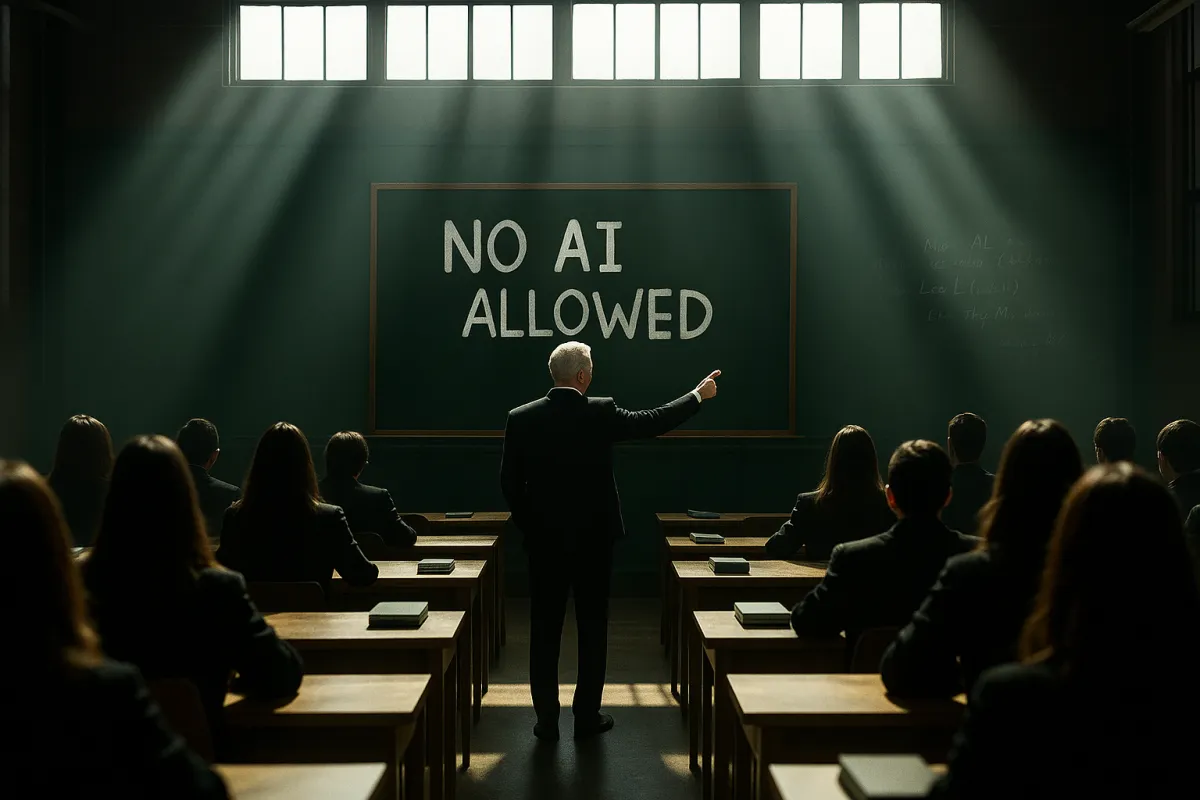
What Socrates Can Teach Us About Today’s AI Panic in Education
Ever wonder what Socrates would say about our current hand-wringing over AI in education?
I do.
I worry when I see educators banning one of the most powerful learning tools ever created simply because learning, in their view, should feel “hard.”
Somewhere in our academic DNA lives a whispered belief:
If it wasn’t difficult, did they really learn?
But what if we’re mistaking artificial struggle for genuine intellectual growth?
When Good Teachers Fear New Tools
I recently read a blog by a professor who proudly banned AI in their classes.
Their reasoning was familiar: Students need to “stop and think.” Learning is supposed to be difficult. Handwritten exams ensure “real” thinking.
And instantly, I was reminded of a moment in Plato’s Phaedrus, when Socrates recounts King Thamus warning that a new invention writing would erode human memory:
“This invention will produce forgetfulness… You have invented an elixir not of memory, but of reminding… You offer your pupils the appearance of wisdom, not true wisdom…” (Phaedrus 275b)
Socrates uses this myth as a caution, not a condemnation.
He never said “abandon writing.”
He said: Think critically about what it enables, and what it might cost.
History shows he needn’t have feared.
Writing didn’t destroy memory, it transformed it. It expanded human intellect rather than weakening it.
Exactly the pattern we’re seeing with AI.
The Inherited Struggle
Banning AI because “learning should be hard” is like insisting true explorers must navigate only by the stars ignoring how compasses opened entirely new worlds.
When we recreate the same academic struggles we endured, believing they were essential, we’re not preserving rigor.
We’re practicing inherited struggle, passing down difficulty for difficulty’s sake.
Every generation mistrusts the next generation’s tools.
Socrates feared writing.
People feared calculators, telephones, cars, the internet, smartphones, social media.
Today, some fear AI.
The argument is old.
The technology is new.
But the pattern is the same.
The Equity Revolution Hidden in Plain Sight
Here’s what the “no AI” professor missed:
AI doesn’t make learning easier. It makes learning more accessible.
And if AI feels “too easy,” it’s not being used deeply enough.
When I use AI in the classroom, it gives students what they need when they need it.
That’s not laziness. That’s equity.
Students with learning differences can articulate complex ideas they’ve always understood but struggled to express.
Students whose first language isn’t English can participate fully in the intellectual dialogue.
Students intimidated by social dynamics can explore ideas without fear of saying the “wrong” thing.
AI, used intentionally, removes barriers—not intellect.
It's like having on-demand Socratic questioning without the intimidation of speaking up in a room.
But here’s the key: Students must use AI to push back against ideas, not merely validate them. Otherwise, it becomes a “yes-man” instead of a thinking partner.
If students think AI is doing the thinking for them, they’re not using it strategically enough.
The Risk-Benefit Calculation We’re Missing
People misuse tools all the time.
We didn’t ban calculators because some students cheated.
We taught proper use.
We didn’t shut down libraries because some plagiarized.
We taught citation.
We don’t eliminate lab equipment because mistakes happen.
We teach lab safety.
Likewise, we shouldn’t ban AI.
We should teach responsible, strategic, ethical use.
Educators who implement blanket bans simply don’t see the benefits.
But that short-sightedness doesn’t stop the world from moving on.
While we argue about compasses, our students are navigating a world assuming they can use them well.
This moment isn’t about whether students should use AI, it’s about redefining what teaching looks like.
And yes, that’s uncomfortable.
It challenges our professional identity.
It forces us to model what we’re still learning ourselves.
But that’s the work.
Aligning Values With Reality
I understand the impulse to protect what feels sacred about learning:
The struggle, the growth, the challenge.
But what if AI doesn’t undermine these values?
What if it amplifies them?
Instead of asking: “How do we protect learning from AI?”
What if we asked: “How can AI help us create the learning we’ve always dreamed of delivering?”
Students handwriting answers while the world moves toward human-AI collaboration aren’t getting a more “authentic” education.
They’re getting an artificially limited one.
Writing didn’t kill memory.
AI won’t kill thinking if we guide its use with wisdom.
We can ban AI and step away from shaping its future.
Or we can embrace our discomfort and help lead students into a world where human-AI collaboration is both ethical and empowering.
So I’ll leave you with this:
Are we preserving intellectual rigor or practicing well-intentioned gatekeeping?
I’d love to hear your thoughts in the comments or on LinkedIn.
Let’s build the future of learning together.
Sarah Gibson is a professor, AI strategist, and Editor-in-Chief of the Journal of Human-Centered AI: Creativity & Practice. She helps people move from fear to flourishing through practical, ethical AI adoption. She teaches and speaks nationally on human-centered responsible AI, AI readiness, and the post-AI classroom.